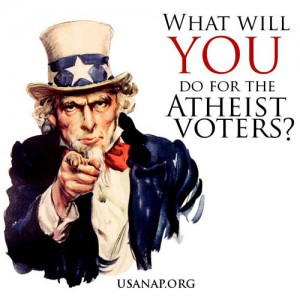Atheists in Politics: A Report on the National Atheist Party Annual Convention

This past weekend I had the pleasure of attending the National Atheist Party’s second annual convention, which this year was held in beautiful San Francisco, California. Speakers for the event included myself, past AHA President Michael Werner, atheist video blogger AronRa, comedian Dusty Smith, atheist activist Jessica Ahlquist, former pastor Jerry Dewitt, blogger Steve Hill, journalist Jamila Bay, and historian Richard Carrier.
The National Atheist Party (NAP), according to their website, seeks to “politically represent U.S. atheists and all who share the goal of a secular government by gathering the political strength of secularists nationwide while being guided by the values of secular humanism and evidenced-based reasoning.” Essentially, the NAP wants to be a viable progressive and secular political party that challenges the dominance of religious right groups like the Tea Party and elements of the Republican Party.
I really enjoyed the speech by AronRa, whose critique of the apocalyptic fundamentalism that motivates the political ideology of so many religious right groups was as astute as it was entertaining. Dusty Smith, a fellow Southerner, was especially entertaining as he related his transition from faith to atheism, a journey that I myself underwent while growing up Jewish in Texas. The harsh experiences he and I both shared regarding the reactions of friends and family members is something that most Southern atheists could relate to, even if they wish they couldn’t.
Perhaps best of all was Michael Werner’s speech, whose message about our collective need for both a science based view of reality and a philosophy to inspire and fulfill us was perhaps the best advertisement for humanism I had heard in quite some time.
The convention itself was attended by people who came from all across the nation, and I was pleased to see that there were plenty of young people there (which isn’t often the case at conventions because of the price and travel requirements). The NAP is definitely still in its early stages as it was only created less than two years ago, but the commitment and excitement I saw at the convention leads me to believe that they have a good chance of becoming an influential group that could eventually help sway elections in favor of the nonreligious community. The NAP has caused nonreligious Americans to start thinking about the disproportionate influence that religious groups have on our government and how we can combat that influence by electing more progressive and secular leaders to public office.
This idea was the main focus of my own speech at the convention. During my talk I discussed the great advocacy and legal work that the American Humanist Association does, in addition to highlighting the AHA’s publications that promote and discuss humanism and the 160 local chapters and affiliates that belong to the AHA.
But the crux of my speech was that our government, at least in its current composition, isn’t really that representative of the citizens it was elected to represent. Unfortunately, the number of religious members of Congress is much higher than the actual religiosity of most Americans, which often leads to our government viewing public policy issues from more of a religious standpoint than the more secular American people.
Regrettably, we have all seen the consequences of an overly religious Congress: a rampant hostility towards evolution, a constant distrust of science and policies that are based upon scientific evidence, and consistent favoritism of religious organizations and individuals over the nonreligious. The result of these actions is that nontheistic Americans often feel estranged or attacked by their very own congressperson and disenfranchised from a political process that necessitates religious belief as a fundamental tenet of good government.
Hopefully, as groups like the NAP become more established this political climate will change and more open humanists and atheists will be elected to office in large numbers. At the very least, groups like the NAP can join the AHA in urging government officials to separate their personal religious beliefs from their duties as a representative of the American people.
